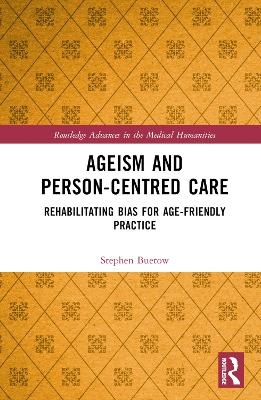
Ageism and Person-Centred Care
Rehabilitating Bias for Age-Friendly Practice
Seiten
2024
Routledge (Verlag)
978-1-032-36835-1 (ISBN)
Routledge (Verlag)
978-1-032-36835-1 (ISBN)
This thought-provoking book exposes the values, judgements, and hierarchies that underlie ageism in care settings. Destabilizing the assumption that biases like ageism are always bad, Buetow suggests that ageism is normatively neutral and that truly person-centred care requires situated acknowledgement of and responsiveness.
This thought-provoking book exposes the values, judgements, and hierarchies that underlie ageism in care settings. Destabilizing the assumption that biases like ageism are always bad, Buetow suggests that ageism is normatively neutral and that truly person-centred care requires situated acknowledgement of and responsiveness to its negative and positive aspects.
Buetow contends that respecting meaningful age differences between persons as moral agents puts ageism on the radar of care environments, weakening barriers to engagement. His analysis moves from concern for age-friendliness to prudent ageism that enables person-centred care to apply practical wisdom in everyday, age-sensitive judgement and decision-making. Challenging political correctness and advocating for justice rather than social justice, Buetow discusses how prudent ageism may advantage some age groups over others in particular circumstances while providing a moral structure for managing real rather than socially constructed differences.
Looking at how age-sensitive judgments combined with a person first approach can inform research, policy, and practice, this book will interest students and researchers from fields like health and social care, and disciplines, such as sociology, psychology, politics, and philosophy.
This thought-provoking book exposes the values, judgements, and hierarchies that underlie ageism in care settings. Destabilizing the assumption that biases like ageism are always bad, Buetow suggests that ageism is normatively neutral and that truly person-centred care requires situated acknowledgement of and responsiveness to its negative and positive aspects.
Buetow contends that respecting meaningful age differences between persons as moral agents puts ageism on the radar of care environments, weakening barriers to engagement. His analysis moves from concern for age-friendliness to prudent ageism that enables person-centred care to apply practical wisdom in everyday, age-sensitive judgement and decision-making. Challenging political correctness and advocating for justice rather than social justice, Buetow discusses how prudent ageism may advantage some age groups over others in particular circumstances while providing a moral structure for managing real rather than socially constructed differences.
Looking at how age-sensitive judgments combined with a person first approach can inform research, policy, and practice, this book will interest students and researchers from fields like health and social care, and disciplines, such as sociology, psychology, politics, and philosophy.
Stephen Buetow is Associate Professor of General Practice and Primary Health Care at the University of Auckland, New Zealand.
Contents
Illustrations
Acknowledgements
1 Introduction
PART I
Engagement with ageism in care
2 Factors predisposing to engagement with ageism
3 Barriers to engaging with ageism
4 Terror, ageism and sexuality
PART II
Propelling ageism forward in care
5 Revisiting bias: Drawing from history to advance ageism
6 Judging bias like ageism
7 Addressing biases akin to ageism: Offend sometimes, shame rarely
8 Moral values for engaging with bias and ageism
9 Prudent ageism: A person-centred approach
| Erscheinungsdatum | 11.07.2024 |
|---|---|
| Reihe/Serie | Routledge Advances in the Medical Humanities |
| Zusatzinfo | 2 Tables, black and white |
| Verlagsort | London |
| Sprache | englisch |
| Maße | 156 x 234 mm |
| Gewicht | 467 g |
| Themenwelt | Sachbuch/Ratgeber ► Gesundheit / Leben / Psychologie |
| Studium ► 1. Studienabschnitt (Vorklinik) ► Med. Psychologie / Soziologie | |
| Studium ► Querschnittsbereiche ► Prävention / Gesundheitsförderung | |
| Sozialwissenschaften ► Soziologie | |
| ISBN-10 | 1-032-36835-7 / 1032368357 |
| ISBN-13 | 978-1-032-36835-1 / 9781032368351 |
| Zustand | Neuware |
| Haben Sie eine Frage zum Produkt? |
Mehr entdecken
aus dem Bereich
aus dem Bereich


